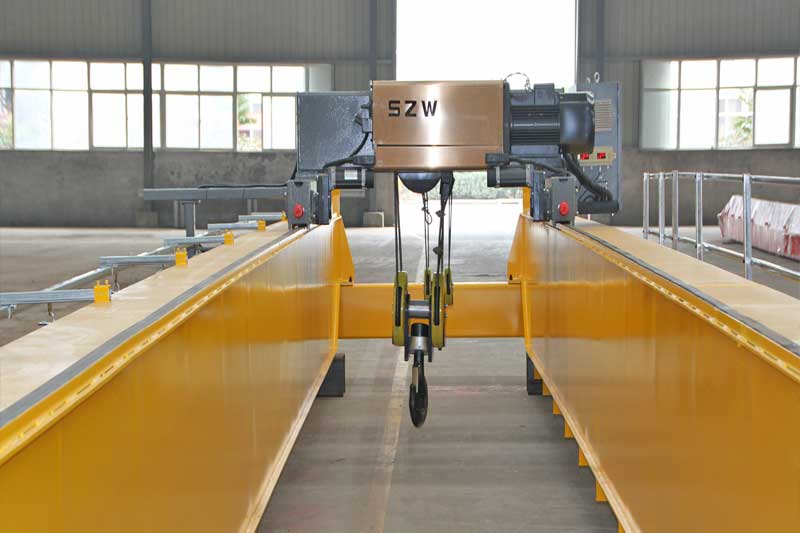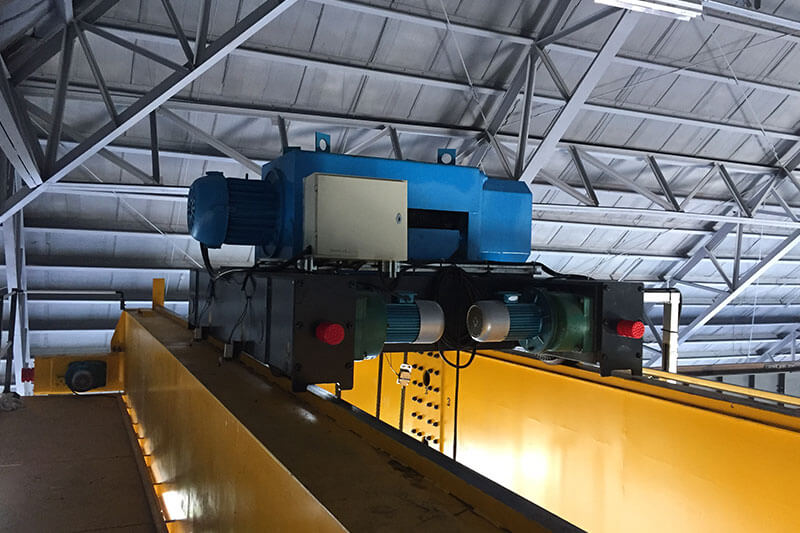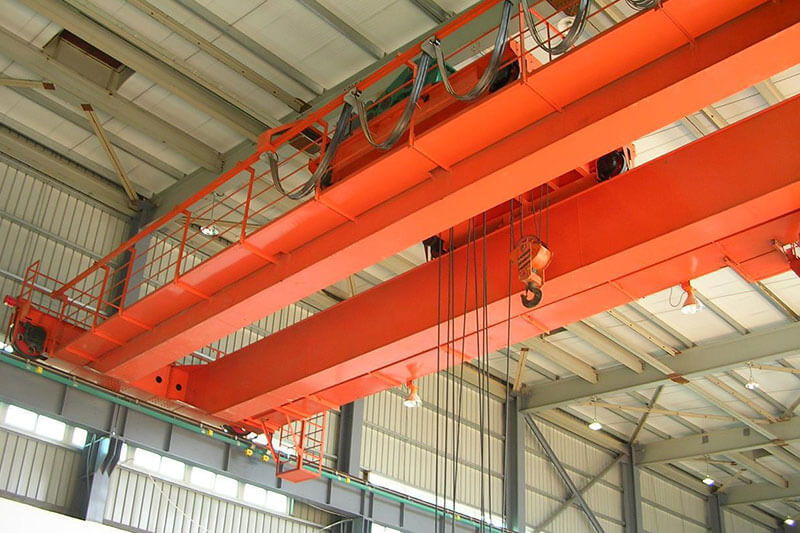Overhead Crane for Handling Molds and Casts in Foundries, 10, 20, 30T
Overhead Cranes for Mold Handling in Foundries . 5 ton, 10 ton, 20 ton, 30 ton overhead crane systems for moving molds and casts in foundry operations.
Overhead Cranes for Mold Handling in Foundries
Foundries are the cornerstone of industrial manufacturing, playing a pivotal role in transforming raw materials, particularly metals, into usable components that drive numerous industries. Across sectors such as automotive, aerospace, construction, and more, foundries serve as crucial hubs where intricate processes take place, including the creation and manipulation of molds used in shaping molten metal into specific forms.
The handling of molds and casts within foundries presents unique challenges due to their varying sizes, shapes, and substantial weights. Ensuring precision and efficiency in manipulating these molds during the manufacturing process is essential for maintaining high-quality production standards. However, traditional lifting equipment often falls short when dealing with these substantial weights and irregular shapes, leading to the need for specialized handling solutions.
This article aims to delve into the world of specialized overhead cranes designed explicitly for foundry operations. These overhead crane systems are engineered to address the intricate challenges associated with efficient and precise mold handling within the dynamic environment of a foundry. Let's explore the significance of foundries in industrial manufacturing, the specific demands for handling molds, and the purpose of exploring tailored overhead cranes for these operations in greater detail.
Foundries' Significance in Industrial Manufacturing
Foundries serve as the backbone of various industries by facilitating the conversion of raw materials into functional components. Their importance spans across a multitude of sectors, contributing to the creation of essential parts and machinery used in everyday life. Whether it's the engine components in vehicles, structural elements in buildings, or intricate parts in aerospace technology, foundries are instrumental in the manufacturing process.
Need for Specialized Equipment for Mold Handling
The manipulation of molds and casts within foundries is a complex task that demands specialized equipment. Molds come in diverse sizes, shapes, and weights, making their precise handling a challenge. Ensuring the integrity of these molds during the manufacturing process directly impacts the quality of the final product. Conventional lifting mechanisms often lack the necessary capabilities to handle the weight and shape diversity of molds efficiently. Therefore, the need for specialized overhead cranes tailored to the unique demands of foundries becomes apparent.
Overhead crane for mold handling
Foundries and Mold Handling
Molds and casts form the bedrock of foundry operations, playing an indispensable role in the manufacturing process. These molds serve as the templates used to shape molten metal into specific components required across various industries. Whether it's intricate machinery parts or structural components, the molds dictate the final form of the product. They act as the blueprint, determining the shape, size, and intricacies of the end product.
In the foundry environment, molds come in an array of shapes and sizes, each designed for a particular purpose. Their significance lies not only in shaping the molten metal but also in maintaining precision and uniformity in the manufactured components. Any deviation in the mold's integrity or handling can directly affect the final product's quality, making their proper management essential in foundry operations.
Challenges in Handling Molds: Weight, Size, and Shape Variations
Handling molds within a foundry presents a myriad of challenges owing to the considerable weight, diverse sizes, and irregular shapes they exhibit. The molds used in foundries can range from relatively small and intricate to significantly large and complex. Some molds weigh several tons and possess intricate geometries that require careful manipulation.
The weight alone poses a significant challenge. Conventional lifting equipment may not possess the necessary capacity to handle these heavy molds efficiently. Additionally, the irregular shapes of molds, often designed intricately to create detailed components, require specialized handling to ensure their integrity is maintained throughout the manufacturing process.
Furthermore, variations in mold sizes demand versatile equipment capable of accommodating these differences seamlessly. Addressing these challenges necessitates specialized tools engineered explicitly for foundry applications.
Importance of Precise Handling for Efficient Production
The precise handling of molds within a foundry environment is crucial for maintaining efficient production processes. Any mishandling or imprecision during the handling of molds can lead to a cascade of issues. This includes deformities in the final product, compromised quality, production delays, and increased operational costs.
Efficient production relies on maintaining a streamlined workflow where molds move seamlessly through various stages of the manufacturing process. Precise handling ensures that molds remain intact and undamaged, preserving their structural integrity for consistent and high-quality production.
In essence, the precision in handling molds directly correlates with the efficiency and quality control within the foundry environment. Hence, the importance of specialized equipment, such as overhead cranes designed for precise mold handling, becomes increasingly evident.
1 ton to 63 ton double girder overhead bridge crane with hoist trolley
Overhead Cranes: Foundry Solutions
In the dynamic environment of foundries, specialized crane systems stand as indispensable assets tailored explicitly for efficient mold handling. These overhead cranes are purpose-built to meet the intricate demands of foundry operations, addressing the challenges posed by the handling of molds and casts.
Unlike conventional lifting equipment, overhead cranes designed for foundries are engineered with precision and adaptability in mind. They are equipped with advanced features and configurations that enable seamless handling of molds of varying shapes, sizes, and weights. These crane systems operate within the confined spaces of foundries, offering flexibility and efficiency in navigating complex production layouts.
Features and Functionalities Designed for Mold Handling
The design and functionalities of overhead cranes in foundries are specifically geared towards overcoming the challenges associated with mold handling. These crane systems boast several key features that make them uniquely suited for foundry operations:
- Enhanced Lifting Capacity: Engineered to handle substantial weights, ranging from smaller molds to significantly heavier ones, with precision and stability.
- Customizable Configurations: Adaptable to different mold sizes and shapes, often offering modular components or adjustable features to accommodate varied requirements.
- Precision Controls: Equipped with precise control mechanisms that ensure smooth and accurate movement, crucial for maintaining mold integrity.
- Safety Measures: Incorporation of advanced safety features, including overload protection and collision avoidance systems, ensuring a secure working environment for personnel and equipment alike.
- Durability and Reliability: Constructed with robust materials and designed for durability, allowing for sustained performance in demanding foundry conditions.
Advantages of Overhead Cranes in Foundry Settings
The utilization of overhead cranes tailored for foundry operations brings about a multitude of advantages that significantly impact operational efficiency:
- Increased Productivity: Streamlined handling processes minimize downtime, allowing for a more efficient workflow within the foundry.
- Precision and Accuracy: The ability to handle molds with precision ensures consistent quality in manufactured components, reducing waste and rework.
- Cost-Effectiveness: Efficient handling of molds leads to reduced operational costs by minimizing damages and optimizing production cycles.
- Adaptability: Tailored configurations enable these cranes to adapt to the diverse needs of different foundry setups, contributing to enhanced operational flexibility.
Tonnage Capacities of Overhead Cranes
Tonnage capacities play a pivotal role in determining the effectiveness of overhead cranes for mold handling within foundries. The diverse sizes and weights of molds demand crane systems with varied lifting capabilities to ensure efficient and safe operations.
The significance of specific tonnages lies in the ability to handle molds of varying sizes and weights without compromising on safety or operational efficiency. These capacities are tailored to accommodate the wide spectrum of molds used in foundry operations, ensuring that each crane is equipped to handle specific loads within its designed capacity.
Overhead cranes tailored for foundry operations often come in distinct tonnage capacities, with common configurations such as 10-ton, 20-ton, and 30-ton lifting capabilities. Each capacity range serves a specific purpose within the foundry environment:
- 10-Ton Crane Capabilities: Ideal for handling smaller to medium-sized molds efficiently, offering precise maneuverability and lifting capabilities within this weight range.
- 20-Ton Crane Capabilities: Designed to handle medium to larger molds with increased lifting capacity, providing versatility and adaptability in managing heavier components.
- 30-Ton Crane Capabilities: Engineered for handling significantly heavier molds, offering robust lifting capabilities to manage larger and more substantial components with precision and stability.
Addressing Diverse Sizes and Weights of Molds
The availability of overhead cranes with varied tonnage capacities addresses the diverse sizes and weights of molds encountered in foundry operations. This range of capacities ensures that foundries can select the appropriate crane system tailored to their specific needs, accommodating the extensive array of molds used in the manufacturing process.
By offering a spectrum of tonnage capacities, overhead cranes provide foundries with the flexibility to handle molds of different sizes, shapes, and weights effectively. This versatility allows for optimized handling processes, ensuring that molds are transported and manipulated with the required precision and safety, regardless of their varied specifications.
Design and Engineering of Mold Handling Cranes
Structural Aspects and Engineering Considerations
The design and engineering of mold handling cranes for foundries encompass several critical aspects aimed at ensuring their effectiveness and reliability:
- Robust Structural Design: These cranes are built with sturdy materials and structural configurations to withstand the demanding environments of foundries while maintaining stability during the handling of heavy molds.
- Precision Control Systems: Advanced control mechanisms are integrated to enable precise movements, ensuring accurate positioning of molds for manufacturing processes.
- Optimized Lifting Mechanisms: The lifting mechanisms are engineered for seamless vertical and horizontal movements, allowing for efficient transport and placement of molds within confined spaces.
- Load Distribution and Stress Analysis: Engineering calculations focus on load distribution and stress analysis to ensure that the crane's components can handle the specific weights and forces exerted during mold handling operations.
Customization for Foundry-Specific Requirements
Foundries often have unique requirements based on their manufacturing processes, layout, and the types of molds utilized. Mold handling cranes are designed with customization options to cater to these specific needs:
- Adaptable Configurations: These cranes offer customizable configurations, allowing for adjustments to accommodate varying mold sizes, shapes, and weights.
- Modular Features: Some crane systems provide modular components that can be added or modified to suit changing foundry needs, ensuring flexibility and adaptability.
- Integration with Existing Infrastructure: Engineers ensure compatibility with existing infrastructure within the foundry, minimizing disruptions during installation or upgrades.
Safety Features and Compliance Standards
Safety remains paramount in foundry operations, and mold handling cranes are equipped with stringent safety features and adhere to industry compliance standards:
- Overload Protection Systems: Sensors and mechanisms are in place to prevent overloading, ensuring safe operation within specified weight limits.
- Collision Avoidance Systems: Advanced technology enables these cranes to detect potential collisions and take preventive measures to avoid accidents.
- Compliance with Standards: These cranes adhere to strict safety and regulatory standards, ensuring compliance with industry-specific regulations and guidelines.
Benefits and Efficiency Gains
Increased Productivity and Reduced Downtime
The utilization of specialized overhead cranes tailored for foundry operations brings forth notable advantages, including increased productivity and minimized downtime:
- Streamlined Workflow: These cranes optimize the handling process, ensuring efficient movement of molds throughout the production cycle. This streamlined workflow reduces delays and enhances overall operational efficiency.
- Quick and Precise Operations: With their precise controls and adaptability, these cranes facilitate swift and accurate mold handling, minimizing idle time and maximizing production output.
- Efficient Resource Utilization: By reducing the time required for handling molds, these cranes enable better utilization of labor and resources within the foundry.
Precision in Handling for Improved Quality Control
Precision is paramount in foundry operations, and specialized overhead cranes play a pivotal role in maintaining precision and enhancing quality control:
- Consistent Mold Integrity: The accurate and careful handling provided by these cranes ensures that molds remain intact and undamaged throughout the manufacturing process, preserving the integrity of the final product.
- Quality Assurance: The precision in positioning and transporting molds results in consistent and uniform manufacturing, minimizing defects and contributing to higher-quality end products.
- Enhanced Inspection and Maintenance: Easy access and positioning of molds facilitated by these cranes aid in better inspection and maintenance procedures, further ensuring quality control measures are met.
Cost-Effectiveness and Long-Term Advantages
Investing in specialized overhead cranes tailored for foundry operations yields long-term benefits, contributing to cost-effectiveness and overall operational advantages:
- Reduced Operational Costs: Efficient handling of molds minimizes damages, leading to reduced waste and operational costs associated with rework or replacements.
- Extended Equipment Lifespan: Proper handling and precise movements provided by these cranes contribute to the prolonged lifespan of molds and other equipment, reducing the need for frequent replacements.
- Sustainable Operational Practices: By optimizing workflows and minimizing waste, these cranes support sustainable practices, aligning with the foundry's environmental and economic goals.

Heavy duty overhead crane with open winch trolley of built up hoist for loads handling with capcity of 5 ton to 550 ton
Applications and Case Studies
Diverse Applications Across Different Foundry Operations
Specialized overhead cranes tailored for foundries find extensive applications across various operations within the manufacturing landscape:
- Automotive Foundries: In automotive manufacturing, these cranes efficiently handle molds for engine components, chassis parts, and intricate body structures, ensuring precise positioning and transport during production.
- Aerospace Foundries: Foundries catering to aerospace industries rely on these cranes for handling molds used in the production of critical aircraft components, ensuring accuracy and adherence to stringent quality standards.
- Construction Foundries: Within construction-related foundries, these cranes facilitate the handling of molds for structural components, facilitating efficient workflows in creating building materials and fixtures.
Benifits
The incorporation of specialized overhead cranes has yielded substantial success stories, showcasing their profound impact on overall productivity in foundry operations:
- Enhanced Efficiency: Foundries incorporating these cranes witnessed improved operational efficiency, achieving higher throughput while maintaining or enhancing product quality.
- Reduction in Lead Times: The streamlined workflows facilitated by these cranes contributed to reduced lead times in manufacturing, enabling quicker turnaround of products.
- Employee Safety and Satisfaction: The ergonomic design and safety features of these cranes have led to a safer working environment, boosting employee morale and job satisfaction.
Future Trends and Innovations
Emerging Technologies in Overhead Crane Systems
The evolution of overhead crane systems for foundries is witnessing the integration of cutting-edge technologies aimed at enhancing their capabilities:
- Automation and Robotics: Advancements in automation and robotics are revolutionizing crane systems, enabling automated movements, predictive maintenance, and improved operational efficiencies.
- IoT and Connectivity: Integration of IoT devices allows for real-time monitoring of crane performance, facilitating data-driven decision-making and predictive maintenance strategies.
- Advanced Control Systems: Incorporation of more intuitive and responsive control interfaces, such as augmented reality (AR) and enhanced user interfaces, simplifies crane operations and training procedures.
- Artificial Intelligence (AI): AI-powered algorithms aid in optimizing crane movements, enhancing safety protocols, and providing predictive analytics for maintenance scheduling.
Advancements Enhancing Efficiency and Safety
Continual advancements are being made to further augment the efficiency and safety features of overhead crane systems in foundries:
- Improved Load Handling: Innovations focus on enhancing load handling capabilities, offering increased precision, faster movements, and more adaptable functionalities to cater to diverse mold handling needs.
- Enhanced Safety Protocols: Further developments in safety measures include more sophisticated collision avoidance systems, advanced sensors for detecting hazards, and real-time feedback mechanisms to prevent accidents.
- Energy Efficiency: Future crane systems aim for reduced energy consumption through the implementation of energy-efficient components and intelligent power management systems.
Predictions for the Future of Mold Handling in Foundries
The future of mold handling in foundries is poised for remarkable transformations driven by technological advancements:
- Integration of Smart Manufacturing: Foundries will increasingly embrace smart manufacturing principles, utilizing interconnected systems and data analytics to optimize mold handling processes and overall operations.
- Greater Flexibility and Adaptability: Crane systems will become more adaptable, accommodating rapid changes in mold design and production requirements with increased flexibility.
- Sustainability Initiatives: Foundries will prioritize sustainable practices, incorporating eco-friendly materials and energy-efficient technologies in crane systems to align with environmental goals.
Get Your Customized Overhead Cranes
Specialized overhead cranes tailored for foundries stand as indispensable assets, addressing the intricate challenges associated with mold handling in industrial manufacturing settings. Their significance lies in their ability to efficiently and precisely handle molds of varying sizes, shapes, and weights, ensuring seamless production processes.
The incorporation of these specialized overhead cranes has brought about a substantial positive impact on foundry operations and productivity:
- Enhanced Efficiency: These cranes optimize workflows, minimize downtime, and streamline mold handling processes, contributing to increased operational efficiency.
- Improved Quality Control: Precision in handling ensures consistent and high-quality production, reducing defects and enhancing overall product integrity.
- Cost-effectiveness: Reduction in operational costs, increased resource utilization, and extended equipment lifespan contribute to long-term cost savings.
In the dynamic landscape of industrial manufacturing, specialized equipment, such as tailored overhead cranes, plays an integral role in driving efficiency, safety, and innovation. Their continual evolution, incorporating advanced technologies and tailored functionalities, underscores their crucial role in meeting the ever-evolving demands of industrial operations.
As foundries continue to evolve, embracing technological advancements and sustainable practices, the role of specialized equipment remains pivotal in fostering progress, optimizing processes, and achieving higher standards of productivity and quality in industrial settings.




